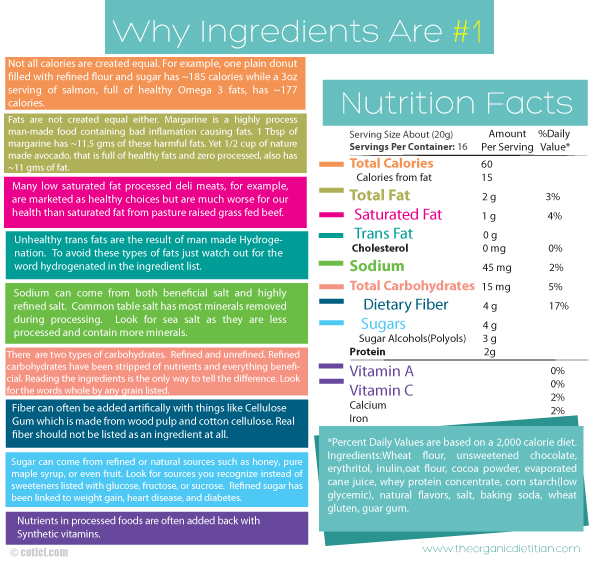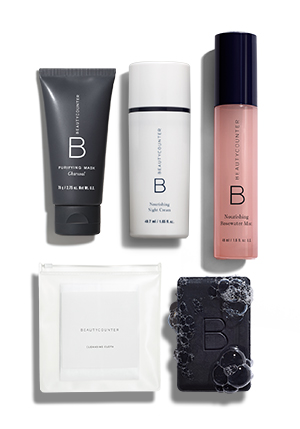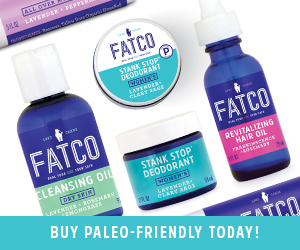11 April, 2014
Why I Don’t Read Nutrition Facts: Ingredients are #1

The food label has looked the same for 20 years and it is now about to get a makeover. Some of the significant changes include more prominent calorie counts and more realistic serving sizes, but could take more than one year to actually be seen on packaging.
Who cares? I certainly do not. Sure, ill admit I used to always focus on the fat and calories found in products I bought. I used to be obsessed with low fat this and fat free that but it can be stressful worrying about going over your counts for the day.
Im here to tell you that it doesn’t have to be that way. Free yourself from the food label hold. I will say that some of the changes they are looking at making could be a good thing for those that insist on reading them. It will hopefully help you realize how large our portion sizes are becoming and how many added calories they are getting by overeating. The other good thing is that it will list added sugars. Sugars can occur naturally in foods such as honey, pure maple syrup, and fruit but it is the addition of processed sugars that can be unhealthy. Too much sugar of any kind is never a good thing.
The proposed new food label is supposed to help us make healthier choices…but by whos standard? This new label might tell consumers to avoid too much saturated fat but not all saturated fat is unhealthy. Coconut oil, for example, is naturally high in saturated fat but the type of fat can be burned quickly as fuel. Studies have shown no evidence that eating saturated fat increased heart attacks and other cardiac events.
Not all fat is created equal…the fat from coconut oil is not the same as the fat from a processed bag of chips. These labels do not tell us which fats are healthy, only the content. These healthy fats also increase the calorie content of the foods because more calories come from fat so what is to say that something higher in calories is not a good food choice?
On the flip side, something that is low in calories or fat does not mean that it is a healthy food. Fat free or light yogurt may look good from a food label perspective but take a look at the ingredient list…added sugar and added artificial flavors and preservatives. Not ingredients that our bodies need to nourish. Plain whole milk yogurt that only contains one real ingredient may have more fat and calories but I would choose that any day over the alternative.
I do not know many people that count their vitamin and mineral intake. That seems crazy tedious. How much can we count on the vitamin and mineral content anyway? White flour for instance is usually enriched with these so despite being highly processed, void of anything natural, and stripped of anything good these nutrients are added back after processing. It appears that processed cereals contain many good vitamins and minerals but they are often artificially sprayed with synthic nutrients to add them back after they were stripped away during processing.
If you take away only one lesson here let it be this….
1. Read Ingredients…not nutrition facts.
2. Look for ingredients you can pernounce and that sound like real food.
3. Look for Whole grains and not refined or enriched.
4. Avoid anything hydrogenated.
5. Look for real forms of sweeteners and not things with glucose, sucrose, or fructose.
I believe instead of focusing on the nutrient contect of foods, which can be fake and recreated in a lab, we should be focusing on what our food is made out of and where it is coming from. We should be teaching consumers how to pick out good food based on ingredients alone.















 80% of chronic dis-ease is rooted in stre
80% of chronic dis-ease is rooted in stre
 As
As 

Great advice. What do you think of sugar alcohols? My husband is diabetic and the non-sugar alternatives are not healthy at all.
Great question! Sugar alcohols are a a type of carbohydrate. I would consider sugar alcohols as an additive and it typically added to processed foods. If you are looking to cut out or cut back on processed foods then you probably would not be buying foods with sugar alcohols in them. Our bodies don’t do a good job of digesting the sugar alcohol and can often result in diarrhea, bloating, gas, and abdominal pain especially if a lot is consumed. Xylitol is one of the more popular sugar alcohols and can come from corn so if you are looking to avoid GMOs then look for organic or one not main from corn. As with all products I recommend looking for ones that are as close to nature as possible. Read the ingredient list and avoid any sweetener with artificial ingredients and additives. Hope this helps. Feel free to contact me with further questions.
I too concentrate on what my food is made of but I have to look at the carbs. Counting carbs is how I control my diabetes.
I can understand that. You can also focus on including healthy carb, protein, and fat at each meal and not have to count anything. My dad recently had to watch his blood sugars and he was told to count carbs and to eat 40-60 carbs at each meal. This is a very old way of looking at food and diabetes. Carbs are the very thing that increase blood sugars so it is now actually better to lower your carb intake and get your carbs from much more nutritious foods like fruits and veggies instead of lots of breads and grains. I am so glad to hear that you are looking at what you food is made out of!
I do eat healthy carbs but am interested to know how you control your blood sugar without counting the carbs…even the healthy ones. If I were to eat more than 3 healthy carbs at a meal, whether it be veggies, fruit, etc., my blood sugar would be high.
I would love to hear more about what you are eating and how you are controlling your sugars and see how I may be able to help you. You can contact me at theorganicdietitian@gmail.com